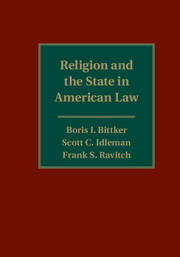Book contents
- Frontmatter
- Dedication
- Contents
- Preface
- 1 History and Introduction
- 2 Church and State in the Nineteenth Century
- 3 Religious Influences and Expressions in Law and Government
- 4 The Establishment Clause
- 5 The Free Exercise Clause
- 6 The Religious Test, Equal Protection, and Free Speech Clauses
- 7 The Definition of Religion
- 8 Church Property Disputes and Church Schisms
- 9 Contracts
- 10 Taxation
- 11 Employment
- 12 Land Use
- 13 Torts
- 14 Criminal Law and Process
- 15 Family Law
- 16 Public Education
- 17 Religious Symbolism on Government Property
- 18 Special Contexts: Prisons and the Military
- Appendix A Federal Constitutional Provisions
- Appendix B State Constitutional Provisions
- Appendix C Selected Federal Statutes 910
- Index
18 - Special Contexts: Prisons and the Military
Published online by Cambridge University Press: 05 October 2015
- Frontmatter
- Dedication
- Contents
- Preface
- 1 History and Introduction
- 2 Church and State in the Nineteenth Century
- 3 Religious Influences and Expressions in Law and Government
- 4 The Establishment Clause
- 5 The Free Exercise Clause
- 6 The Religious Test, Equal Protection, and Free Speech Clauses
- 7 The Definition of Religion
- 8 Church Property Disputes and Church Schisms
- 9 Contracts
- 10 Taxation
- 11 Employment
- 12 Land Use
- 13 Torts
- 14 Criminal Law and Process
- 15 Family Law
- 16 Public Education
- 17 Religious Symbolism on Government Property
- 18 Special Contexts: Prisons and the Military
- Appendix A Federal Constitutional Provisions
- Appendix B State Constitutional Provisions
- Appendix C Selected Federal Statutes 910
- Index
Summary
This chapter addresses the application of the First Amendment religion clauses as well as other religion-related laws to the special contexts of prisons and the military. Much like public education, these contexts warrant separate treatment because of the pervasive governmental authority and control found within them and the attendant custodial or quasi-custodial nature of the relationship between the government and many of the persons subject to that authority and control. Additionally, each context is defined by levels of expertise and experience on the part of the officials charged with their operation and a corresponding level of judicial deference that is typically not present in other settings. Of course, most of the relevant laws – the Free Exercise Clause, the Establishment Clause, the Religious Freedom Restoration Act (RFRA), and, in the case of state prisons, the Religious Land Use and Institutionalized Persons Act (RLUIPA) – remain applicable, but the unique characteristics and interests found within each context tend to alter, at times significantly, the interpretation and implementation of the terms and doctrines of these laws.
Prisons: In General
The interplay between religion and incarceration has a long and involved history. “Churches were among the first institutions to provide asylum for accused criminals. The establishment of prisons and penitentiaries followed religious tenets that encouraged offenders to do penance for their crimes and to reject a criminal lifestyle while being isolated from others.” The contemporary reality, perhaps related to this history, is that the context of incarceration seems to generate a disproportionate number of religious freedom claims, which, in turn, generate a large number of judicial decisions. The causes for this pattern, to the extent it is an accurate observation, are several and fairly evident. The mere fact of confinement, for example, increases the likelihood that religious practices will somehow be constrained. Although “[t]he right to exercise religious practices and beliefs does not terminate at the prison door … [t]he free exercise right … is necessarily limited by the fact of incarceration, and may be curtailed in order to achieve legitimate correctional goals or to maintain prison security.”
- Type
- Chapter
- Information
- Religion and the State in American Law , pp. 809 - 878Publisher: Cambridge University PressPrint publication year: 2015



